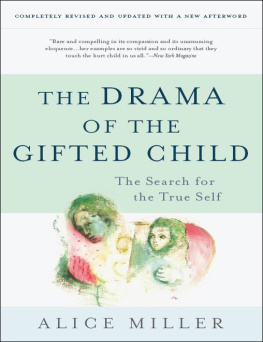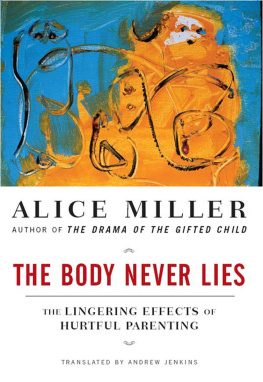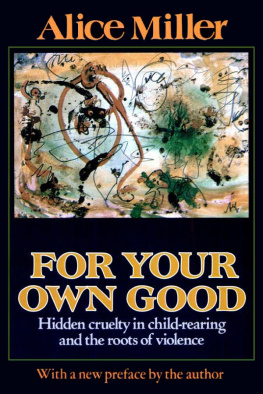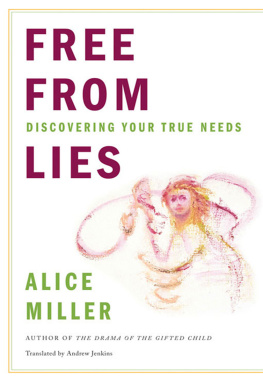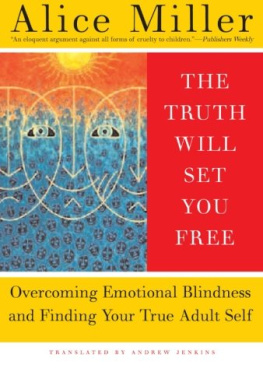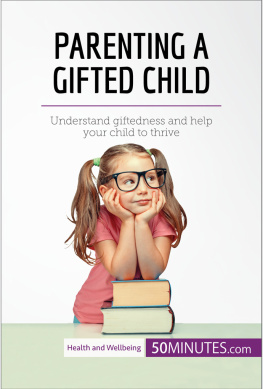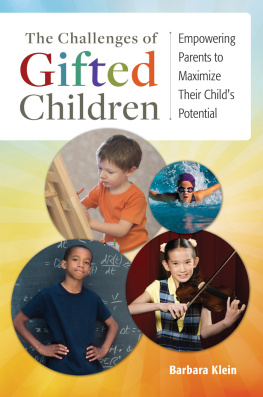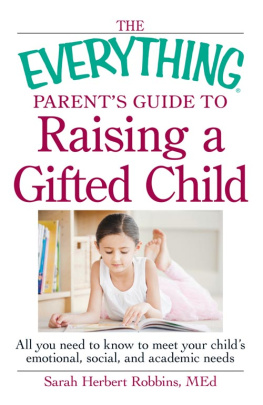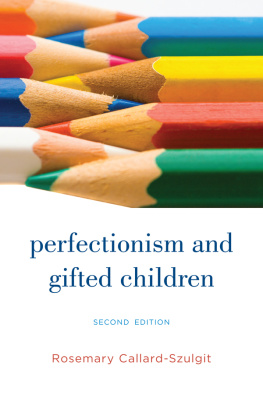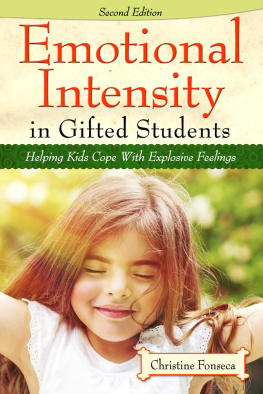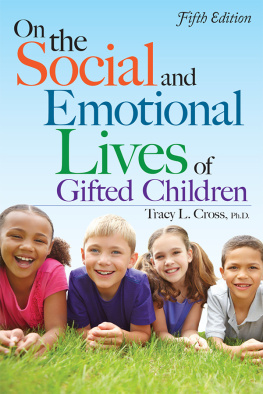THE DRAMA OF THE
GIFTED CHILD
THE
DRAMA
OF THE GIFTED
CHILD
The Search for the True Self
Completely Revised and Updated
With a New Afterword by the Author
Alice Miller
TRANSLATED BY RUTH WARD

Basic Books
A Member of the Perseus Books Group
A previous version of chapter 1 appeared in the International Journal of Psychoanalysis 60 (1979): 47; a previous version of chapter 2 appeared in the International Review of Psychoanalysis 6 (1979): 61.
Grateful acknowledgment is made for permission to reprint excerpts from the following: Hermann Hesse, A Childs Heart, from Klingsors Last Summer , translated by Richard and Clara Winston (New York: Farrar, Straus and Giroux, 1970), and Demian , translated by Michael Roloff and Michael Lebeck (New York: Harper & Row, 1965).
Revised edition copyright 1997 by Basic Books. Afterword to the revised edition copyright 2007 by Alice Miller.
Originally published in German as Das Drama des begabten Kindes . Copyright 1979 by Suhrkamp Verlag Frankfurt am Main. First published in the United States as Prisoners of Childhood . Copyright 1981 by Basic Books.
All rights reserved. No part of this book may be reproduced in any manner whatsoever without written permission except in the case of brief quotations embodied in critical articles and reviews. For more information, address Basic Books, 387 Park Ave. South, New York, N.Y 10016.
Designed by Ellen Levine
Library of Congress Cataloging-in-Publication Data
Miller, Alice.
[Drama des begabten Kindes. English]
The drama of the gifted child : the search for the true self /
Alice Miller ; translated by Ruth Ward. 3rd ed., completely rev. and updated with a new afterword by the author.
p. cm.
Includes bibliographical references and index
ISBN-13 978-0-465-01690-7
ISBN-10 0-465-01690-1
1. Adult child abuse victimsMental health. 2. Adult child abuse victimsRehabilitation. 3. Parent and child. 4. Narcissistic injuries. 5. Repression (Psychology). 6. Self-help techniques.
I. Title.
RC569.5.C55M55313 1997
| 616.8582239DC21 | 97-47532 |
| CIP |
39 38 37 36 35 34
Contents
THE DRAMA OF THE
GIFTED CHILD
The Drama of the Gifted Child and How We Became Psychotherapists
E XPERIENCE has taught us that we have only one enduring weapon in our struggle against mental illness: the emotional discovery of the truth about the unique history of our childhood. Is it possible, then, to free ourselves altogether from illusions? History demonstrates that they sneak in everywhere, that every life is full of themperhaps because the truth often seems unbearable to us. And yet the truth is so essential that its loss exacts a heavy toll, in the form of grave illness. In order to become whole we must try, in a long process, to discover our own personal truth, a truth that may cause pain before giving us a new sphere of freedom. If we choose instead to content ourselves with intellectual wisdom, we will remain in the sphere of illusion and self-deception.
The damage done to us during our childhood cannot be undone, since we cannot change anything in our past. We can, however, change ourselves. We can repair ourselves and gain our lost integrity by choosing to look more closely at the knowledge that is stored inside our bodies and bringing this knowledge closer to our awareness. This path, although certainly not easy, is the only route by which we can at last leave behind the cruel, invisible prison of our childhood. We become free by transforming ourselves from unaware victims of the past into responsible individuals in the present, who are aware of our past and are thus able to live with it.
Most people do exactly the opposite. Without realizing that the past is constantly determining their present actions, they avoid learning anything about their history. They continue to live in their repressed childhood situation, ignoring the fact that it no longer exists. They are continuing to fear and avoid dangers that, although once real, have not been real for a long time. They are driven by unconscious memories and by repressed feelings and needs that determine nearly everything they do or fail to do.
The repression of brutal abuse experienced during childhood drives many people to destroy their lives and the lives of others. In an unconscious thirst for revenge, they may engage in acts of violence, burning homes and businesses and physically attacking other people, using this destruction to hide the truth from themselves and avoid feeling the despair of the tormented child they once were. Such acts are often done in the name of patriotism or religious beliefs.
Other people actively continue the torture once inflicted upon them in self-scourging clubs of every sort and in sadomasochistic practices. They think of such activities as liberation. Women who allow their nipples to be pierced in order to hand rings from them can then pose for newspaper photographs, proudly saying that they felt no pain when having it done and that it was even fun for them. One need not doubt the truth of their statements; they had to learn very early in life not to feel pain, and today they would go to any lengths not to feel the pain of the little girl who was once sexually exploited by her father and had to imagine that it was fun for her.
Repressed pain may reveal itself more privately, as in a woman, sexually exploited as a child, who has denied her childhood reality and in order not to feel the pain is perpetually fleeing her past with the help of men, alcohol, drugs, or achievement. She needs a constant thrill to keep boredom at bay; not even one moment of quiet can be permitted during which the burning loneliness of her childhood experience might be felt, for she fears that feeling more than death. She will continue in her flight unless she learns that the awareness of old feelings is not deadly but liberating.
The repression of childhood pain influences not only the life of an individual but also the taboos of the whole society. The usual run of biographies illustrates this very clearly. In reading the biographies of famous artists, for example, one gains the impression that their lives began at puberty. Before that, we are told, they had a happy, contented, or untroubled childhood, or one that was full of deprivation or very stimulating. But what a particular childhood really was like does not seem to interest these biographersas if the roots of a whole life were not hidden and entwined in its childhood. I should like to illustrate this with a simple example.
Henry Moore describes in his memoirs how, as a small boy, he massaged his mothers back with an oil to soothe her rheumatism. Reading this suddenly threw light for me on Moores sculptures: the great, reclining women with the tiny headsI could now see in them the mother through the small boys eyes, with the head high above, in diminishing perspective, and the back close before him and enormously enlarged. This interpretation may be irrelevant for many art critics, but for me it demonstrates how strongly a childs experiences may endure in his unconscious and what possibilities of expression they may awaken in the adult who is free to give them rein. Now, Moores memory did not concern a traumatic event and so could survive intact. But every childhoods traumatic experiences remain hidden and locked in darkness, and the key to our understanding of the life that follows is hidden away with them.

